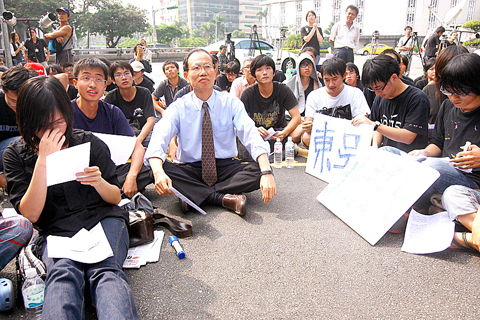Hundreds of college students and professors protesting the police crackdown on demonstrations against the visit of China’s Association for Relations Across the Taiwan Strait Chairman Chen Yunlin (陳雲林) in recent days were forcibly evicted yesterday by police from the front gate of the Executive Yuan.
The police later dropped the students at several different locations including Taipei’s Zhongshan District, National Taiwan University and Nangang.
Before the eviction began at around 4:40pm, the students had already decided in a vote that wherever they were dropped off, they would reassemble and discuss their next move at Liberty Square, in front of the National Taiwan Democracy Memorial Hall.

PHOTO: CNA
“The police said we would all be sent to different places without public transportation, but no matter where they take us, we will be back and continue our protest,” said Huang Wei-lin (黃威霖), a graduate student of politics at National Taiwan University (NTU).
The students began the sit-in on Thursday morning with a petition demanding that President Ma Ying-jeou (馬英九) and Premier Liu Chao-shiuan (劉兆玄) apologize for the excessive use of force by police, that National Police Agency (NPA) Director-General Wang Cho-chiun (王卓鈞) and National Security Bureau Director Tsai Chao-ming (蔡朝明) step down and that the government scrap the Assembly and Parade Law (集會遊行法).
When hundreds of police clad in riot-gear arrived at the scene and started to encircle the students, they linked arms in an attempt to make it harder for police to remove them.
They started singing We Shall Overcome led by Fan Yun (范雲), an associate professor of sociology at NTU.
Sticking to their promise of keeping their demonstration peaceful, the students chanted “Peace, Peace, Peace” and “Human Rights, Human Rights, Human Rights” in chorus as four or five police officers carried each of them away toward the waiting patrol cars.
“We are here for peace. We don’t want to take aim at the police, but the government behind them, as it gave them the order to use excessive force,” said one student.
During the approximately 30 hour sit-in, Executive Yuan Secretary-General Hsueh Hsiang-chuan (薛香川) emerged to talk to the students, but his 50-minute conversation with them ended up making them more “disappointed.”
Yesterday morning, Hsueh took ten more questions from the students at the site after sitting on the ground with them while listening to their petition statement.
While many students were still lining up to raise questions, Hsueh decided to cut the conversation short and returned to the Executive Yuan under police protection, leaving the students shouting “[Give us a] timetable.”
“He dodged our questions. We will continue to protest until we receive a positive response,” Huang said.

Chinese Nationalist Party (KMT) Chairman Eric Chu (朱立倫), spokeswoman Yang Chih-yu (楊智伃) and Legislator Hsieh Lung-chieh (謝龍介) would be summoned by police for questioning for leading an illegal assembly on Thursday evening last week, Minister of the Interior Liu Shyh-fang (劉世芳) said today. The three KMT officials led an assembly outside the Taipei City Prosecutors’ Office, a restricted area where public assembly is not allowed, protesting the questioning of several KMT staff and searches of KMT headquarters and offices in a recall petition forgery case. Chu, Yang and Hsieh are all suspected of contravening the Assembly and Parade Act (集會遊行法) by holding

PRAISE: Japanese visitor Takashi Kubota said the Taiwanese temple architecture images showcased in the AI Art Gallery were the most impressive displays he saw Taiwan does not have an official pavilion at the World Expo in Osaka, Japan, because of its diplomatic predicament, but the government-backed Tech World pavilion is drawing interest with its unique recreations of works by Taiwanese artists. The pavilion features an artificial intelligence (AI)-based art gallery showcasing works of famous Taiwanese artists from the Japanese colonial period using innovative technologies. Among its main simulated displays are Eastern gouache paintings by Chen Chin (陳進), Lin Yu-shan (林玉山) and Kuo Hsueh-hu (郭雪湖), who were the three young Taiwanese painters selected for the East Asian Painting exhibition in 1927. Gouache is a water-based

Taiwan would welcome the return of Honduras as a diplomatic ally if its next president decides to make such a move, Minister of Foreign Affairs Lin Chia-lung (林佳龍) said yesterday. “Of course, we would welcome Honduras if they want to restore diplomatic ties with Taiwan after their elections,” Lin said at a meeting of the legislature’s Foreign Affairs and National Defense Committee, when asked to comment on statements made by two of the three Honduran presidential candidates during the presidential campaign in the Central American country. Taiwan is paying close attention to the region as a whole in the wake of a

OFF-TARGET: More than 30,000 participants were expected to take part in the Games next month, but only 6,550 foreign and 19,400 Taiwanese athletes have registered Taipei city councilors yesterday blasted the organizers of next month’s World Masters Games over sudden timetable and venue changes, which they said have caused thousands of participants to back out of the international sporting event, among other organizational issues. They also cited visa delays and political interference by China as reasons many foreign athletes are requesting refunds for the event, to be held from May 17 to 30. Jointly organized by the Taipei and New Taipei City governments, the games have been rocked by numerous controversies since preparations began in 2020. Taipei City Councilor Lin Yen-feng (林延鳳) said yesterday that new measures by